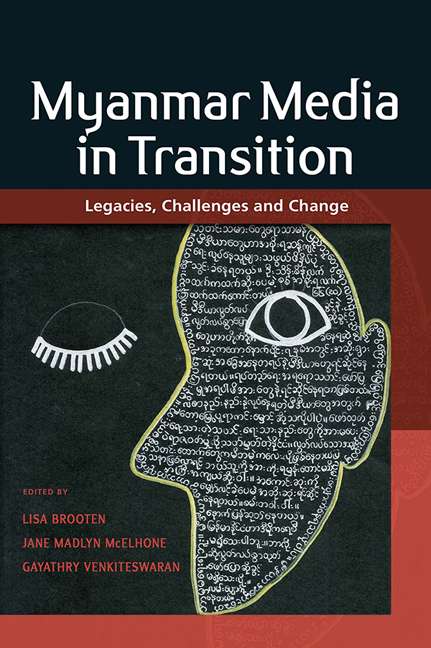Book contents
- Frontmatter
- Contents
- Contributors and Editors
- Burma or Myanmar? A Note on Terminology
- 1 Introduction: Myanmar Media Historically and the Challenges of Transition
- Part I Structural Constraints and Opportunities
- Part II Journalism in Transition
- Part III Creative Expression
- Part IV Society and Media
- Epilogue: Media Studies in Myanmar – Where Do We Go from Here?
- Index
Epilogue: Media Studies in Myanmar – Where Do We Go from Here?
Published online by Cambridge University Press: 07 September 2019
- Frontmatter
- Contents
- Contributors and Editors
- Burma or Myanmar? A Note on Terminology
- 1 Introduction: Myanmar Media Historically and the Challenges of Transition
- Part I Structural Constraints and Opportunities
- Part II Journalism in Transition
- Part III Creative Expression
- Part IV Society and Media
- Epilogue: Media Studies in Myanmar – Where Do We Go from Here?
- Index
Summary
Media have immense power to shape the stories we hear and see and, by extension, how we understand the world. Through new technologies we contribute to the ongoing construction of these stories. It is no surprise that media are one of the first targets of authoritarian leaders who seize control, repressing or assimilating them somehow into the power structure. Forms of control in democratic societies are more subtle, and the threats less severe for those who challenge power holders, but media are nonetheless sites of struggle over who defines the public agenda as well as the discourse used to discuss it. Media play multiple, shifting and highly contextual roles, perpetuating the status quo as agents of stability; holding officials and official institutions to account as agents of restraint; and challenging the status quo and holding the powerful to account as agents of change (McCargo 2003). We have seen throughout this volume how a single media outlet can play all of these roles at various times. As media have become more pervasive in our lives, it is vital that we understand as much as possible about the people and organizations that produce the stories we see, what effects these representations are having, and how these phenomena function for or against the interests of the various key stakeholders, especially the public, at local, national and global levels.
The field of media studies in Myanmar is just beginning to develop. This short summary addresses only the research published in English, but we encourage a similar assessment of the research available in Myanmar language. The majority of research in English is comprised of reports written by advocacy organizations or journalists, and is mainly descriptive, although some reports do analyse new or reformed media laws, or assess the changing state of freedom of expression. This body of work is also largely focused on journalism and on events in the major cities of Yangon and Mandalay. While media studies include the study of journalism, the field is much broader in scope, incorporating all types of media platforms and content and moving beyond the “how-to” to focus critical and analytical attention on three primary areas: media texts, media audiences and media industries. In Myanmar, media-related educational opportunities focus on practical journalism skills training, and to some extent filmmaking.
- Type
- Chapter
- Information
- Myanmar Media in TransitionLegacies, Challenges and Change, pp. 387 - 394Publisher: ISEAS–Yusof Ishak InstitutePrint publication year: 2019



